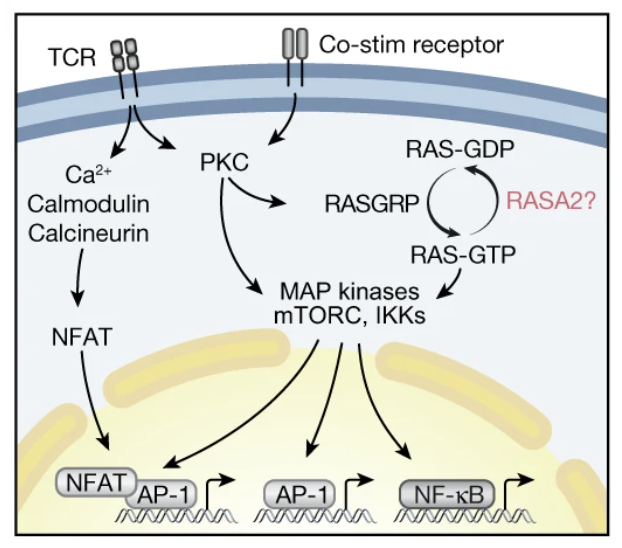
Julia Carnevale, Eric Shifrut, Nupura Kale, William A. Nyberg, Franziska Blaeschke, Yan Yi Chen, Zhongmei Li, Sagar P. Bapat, Morgan E. Diolaiti, Patrick O’Leary, Shane Vedova, Julia Belk, Bence Daniel, Theodore L. Roth, Stefanie Bachl, Alejandro Allo Anido, Brooke Prinzing, Jorge Ibañez-Vega, Shannon Lange, Dalia Haydar, Marie Luetke-Eversloh, Maelys Born-Bony, Bindu Hegde, Scott Kogan, Tobias Feuchtinger, Hideho Okada, Ansuman T. Satpathy, Kevin Shannon, Stephen Gottschalk, Justin Eyquem, Giedre Krenciute, Alan Ashworth & Alexander Marson
Nature, 24 August 2022
The efficacy of adoptive T cell therapies for cancer treatment can be limited by suppressive signals from both extrinsic factors and intrinsic inhibitory checkpoints1,2. Targeted gene editing has the potential to overcome these limitations and enhance T cell therapeutic function3,4,5,6,7,8,9,10. Here we performed multiple genome-wide CRISPR knock-out screens under different immunosuppressive conditions to identify genes that can be targeted to prevent T cell dysfunction. These screens converged on RASA2, a RAS GTPase-activating protein (RasGAP) that we identify as a signalling checkpoint in human T cells, which is downregulated upon acute T cell receptor stimulation and can increase gradually with chronic antigen exposure. RASA2 ablation enhanced MAPK signalling and chimeric antigen receptor (CAR) T cell cytolytic activity in response to target antigen. Repeated tumour antigen stimulations in vitro revealed that RASA2-deficient T cells show increased activation, cytokine production and metabolic activity compared with control cells, and show a marked advantage in persistent cancer cell killing. RASA2-knockout CAR T cells had a competitive fitness advantage over control cells in the bone marrow in a mouse model of leukaemia. Ablation of RASA2 in multiple preclinical models of T cell receptor and CAR T cell therapies prolonged survival in mice xenografted with either liquid or solid tumours. Together, our findings highlight RASA2 as a promising target to enhance both persistence and effector function in T cell therapies for cancer treatment.